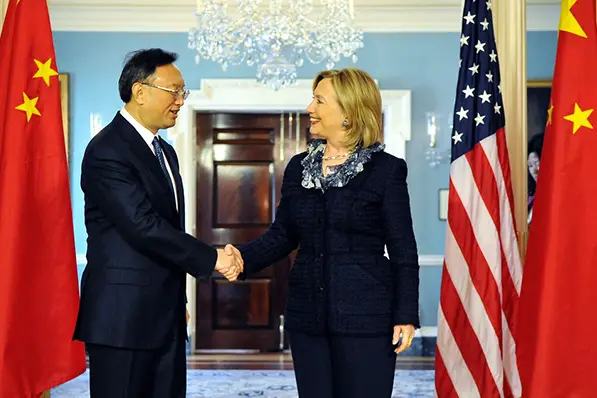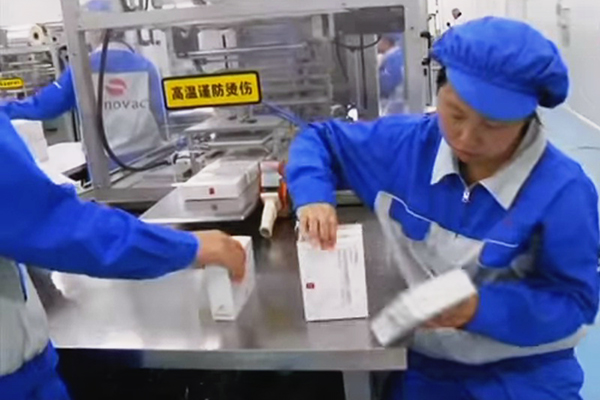
Editor’s note: This article was first written in 2016. It does not reference COVID-19 or COVID-19 vaccines, but it does shed light on the multi-billion dollar global vaccine market and how business is conducted, along with concerns about vaccine oversight, quality control, adverse events and safety testing.
***
Because of a 2014 classification change, Chinese manufactured vaccines were given the greenlight to be shipped in bulk to as many as 152 low and middle-income countries and can now bypass any inspection from any other country, including the U.S. — all because of the work of the Clinton Foundation.
The World Health Organization (WHO) reported that year that vaccines will be pre-qualified, meaning they are so “confident in the quality, safety and effectiveness of vaccines that are made in China” that other countries would no longer require additional safety testing.
The Clinton Foundation, which is heavily involved in vaccine programs across the world, has reportedly been working with the Chinese vaccine manufacturers to give them pre-qualification, which was achieved in 2014 with little mention by the mainstream media.
A report by WHO states: “The Clinton Health Access Initiative (CHAI) has been working with Chinese suppliers to support their applications for WHO prequalification for several vaccine candidates for the last two years, says Joshua Chu, CHAI’s Director, Vaccines Markets.”
Can we trust China to manufacture vaccines?
That may be hard for many people to do after the recent Chinese vaccine scandal.

Photo via YOUTUBE
China’s 2016 Vaccine Scandal
Chinese vaccine manufacturers, wholesale sellers, and buyers came under fire in 2016 over improperly transported and expired vaccines. The vaccinations were not refrigerated, and sold near their expiration dates, which made them virtually useless.
More than 130 people were arrested, (although the link now says 37) but most importantly it shed light on flaws within the system.
Another situation occurred in 2013 after 17 children, including 8 infants, passed away after receiving a Hepatitis B vaccine. Officials said the deaths were not linked to the vaccines, but the incident raised eyebrows over the safety of vaccines in China.
There is weak oversight in the process, leaving the vaccine makers and distributors to escape regulation from outside of China even when vaccines are being shipped to other countries. Liability for those who may be hurt from such vaccines shipped across the world is also a bigger concern.
Lance Rodewald, head of WHO’s expanded program on immunization (EPI) in China, had this to say – “(the new regulations) have made it possible for the United Nations and other agencies to procure life-saving vaccines for countries without the capacity to make high quality vaccines or the resources to purchase them.”
But while many surely do follow the regulations, the lack of oversight is troubling to others, especially considering that more and more vaccines from China could make their way to the U.S. in the coming years.
U.S. Pharmaceuticals are Already Made in China
An estimated of 80% of major ingredients used in U.S. pharmaceuticals are manufactured overseas according to a 2019 report from the Council on Foreign Relations, with most materials coming from India and China. This is already a serious problem, as there is a lack of inspections of these ingredients.
When the FDA tests these ingredients, they often do not comply to safety standards.
In one instance, the active ingredients for the drug Makena (seven samples were Chinese and three from U.S.-based repackagers) were tested by the drug’s manufacturer, USA Today reported, and the company found that eight samples did not comply, and one Chinese sample was actually just made of glucose.
In this new vast global medicine shipping operation, the concern is that mistakes like these are more commonplace than people realize.
Can this happen to vaccines? Because of their recent pre-qualification status, many vaccines will not require inspection outside of China.
And the FDA rarely visits pharmaceutical manufacturing sites in other countries.
According to a U.S. Government Accountability report, “up to two-thirds of foreign pharmaceutical sites have never undergone an FDA inspection.”
Clintons’ Involvement
Hillary Clinton was a part of the Clinton Foundation (originally started by her husband Bill Clinton in 1997) between 2013 and 2015. The WHO reported China’s pre-qualification of vaccines in 2014.
The science is clear: The earth is round, the sky is blue, and #vaccineswork. Let's protect all our kids. #GrandmothersKnowBest
— Hillary Clinton (@HillaryClinton) February 3, 2015
It’s no surprise that someone who is fond of pushing vaccines despite their well-established side effects and risks of catastrophic events (currently, they contain surprising amounts of heavy metals and additives – billions in payouts have been given to vaccine injury victims since 1986) would allow China, the country unfortunately known for producing some of the most toxic unsafe products on the planet (see here for info on food fraud and questionable and potentially harmful organic regulations) in recent years, to make vaccines with no additional oversight.
Clinton has also been accepting the most donation money from the pharmaceutical companies compared to other recent presidential candidates, which shows the industry’s support for her.
Unfortunately rather than focusing on “greening our vaccines” and removing or at least further studying the additives that have been causing serious health problems, those who support the pharmaceutical industry continue to focus on profit over safety and accountability.
Even though Hillary herself once questioned the safety of vaccines (including a possible link to autism) in this quote included in a campaign questionnaire: “(We are) committed to make investments to find the causes of autism, including possible environmental causes like vaccines,” her namesake foundation has now paved the way for China to become one of the top vaccine manufacturers globally.
Currently it is not known whether Chinese vaccines are making their way to the U.S. or not, but huge pharmaceutical companies such as Merck have facilities in China and are already establishing partnerships with Chinese companies.
For now, the only way to know for sure is to ask plenty of questions (and be sure to read the full insert before considering a vaccine as well).
Still have questions about vaccines? Don’t miss this year’s biggest and most important event, the investigative 7 part docu-series: The Truth About Vaccines, playing FREE online. Click HERE To Watch Now.
Thanks for installing the Bottom of every post plugin by Corey Salzano. Contact me if you need custom WordPress plugins or website design.




